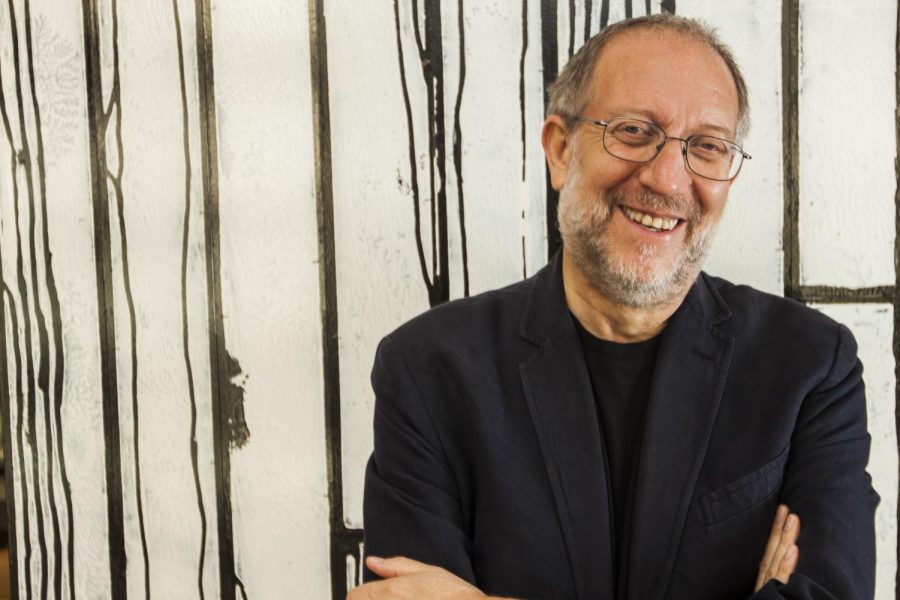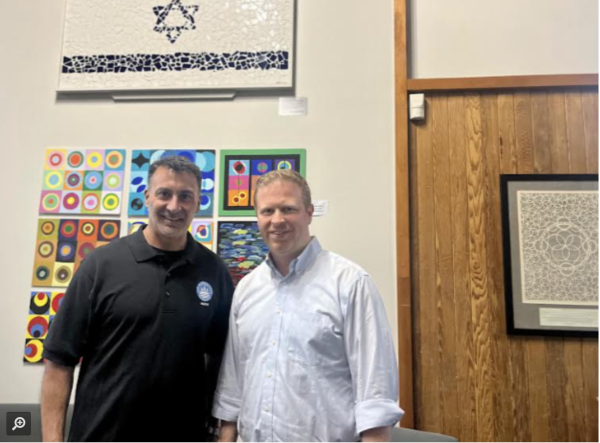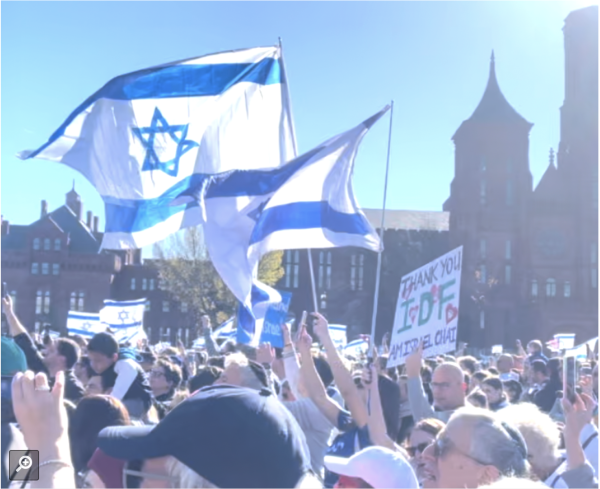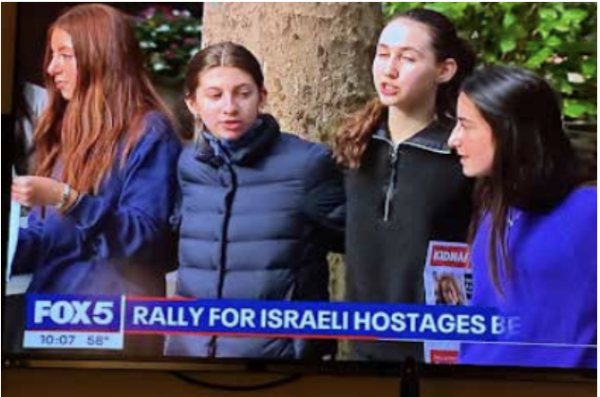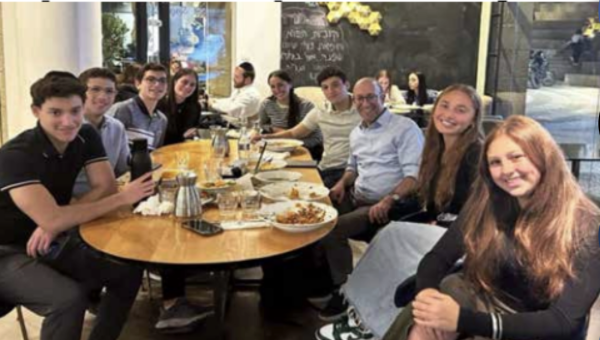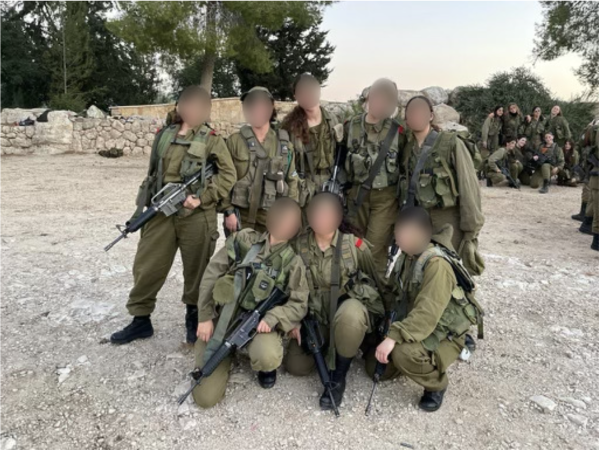A Conversation with Yossi Klein Halevi, Author of ‘Letters To My Palestinian Neighbor’
Yossi Klein Halevi shares insights on his writing process, and the current state of the Israeli-Palestinian conflict
April 12, 2021
Yossi Klein Halevi, an American-born Jewish author, immigrated to Israel in 1983, where he currently works as a writer, journalist, and political activist. In 2018, Halevi published his latest book, Letters To My Palestinian Neighbor, in which he opens a profound dialogue with a hypothetical Palestinian on the other side of the border that separates West Jerusalem and the West Bank. In each chapter, Yossi addresses a letter to this imaginary neighbor, explaining his narrative as an Israeli Jew, and ultimately attempting to reach a sense of mutual understanding between two legitimate, wounded nations.
As an Israeli-born Jewish teenager living in Seattle, I have been both confused and frustrated at the ongoing, heartbreaking conflict between my people and the Palestinians. I picked up Letters To My Palestinian Neighbor in the summer of 2019 in hopes of coming to a resolution on where I stood in the conflict. On one hand, I felt that my Israeli heritage should define my position—how could I align myself with any other ideology than being pro-Israel, even at the expense of Palestinian autonomy? However, having spent most of my life in a politically charged, liberal city thousands of miles away from my homeland, I also felt paradoxically detached from the stance I believed was expected of me from my family and community.
From the very first page, I found myself enthralled by the incredible narration and storytelling—every word sounded as if it was a reflection of my innermost thoughts, and every burning question I had was thoughtfully addressed in each paragraph. For the first time, I felt that my voice, as an Israeli-American Jew who wants nothing more than to reach a peaceful consensus between two sovereign peoples, was finally heard.
On February 25th, 2021, I was given the opportunity to meet one on one with the best-selling author who forever changed my outlook on not only the Israeli-Palestinian conflict, but my own Israeli-Jewish identity.
Responses have been edited for clarity.
Did your feelings/opinions toward the conflict change since receiving feedback from Palestinians in response to Letters To My Palestinian Neighbor?
My opinions didn’t change. I’ve been involved in this issue for a very long time, and I covered this as a journalist, so my opinions were pretty steady. But what did change for me was me… I changed. My being changed because I had this intimate exposure to Palestinians, and saw how the conflict looked through their eyes, and what they’re experiencing. And, you know, since the Second Intifada in the early 2000s, most Israelis tend not to notice the Palestinians… I was angry for good reason. But [Israelis] don’t look, we don’t pay attention. And when I say that my “being” was changed by Palestinians, I mean that I lost my ability NOT to look. So I notice my neighbors.
Is there anything you would change about your book if you had the ability to sit down and write it from scratch again right now?
Not in an overall way, [although] there were some points I would have put in. For example, a clearer understanding of what this conflict is about. That’s something that actually did come through conversations afterwards with Palestinians. And what I would have liked to have written in the book is that this conflict is really about who started it… Who is it for? And depending on where you sit in this conflict, you’ll have a different response. Palestinians will say, “Well, you did because we were living our lives. And you created the conflict by coming here.” And the Jews will say, “We want to come home, we have every right to come home, and we offer you a two state solution, and you rejected it every time.” And depending on which side you set, is how that sounds to you.
Another point that I would have wanted to elaborate on is the great success of the Jewish people. Over 2,000 years of exile was to maintain a kind of vicarious connection [to the Land of Israel]. Even though we weren’t physically there, we were vicarious. We did it through faith, and prayer, and ritual, and memory. And we managed to turn our uprooting into a kind of extended continuation of our existence.
In response to your first point, do you think that rehashing the question of who started what is conducive to the overall mending of the conflict? Does that not give both sides more of an opportunity to point fingers?
Yeah, I think that it’s important to understand that, that this is actually the way in which it works. [We need to] write it out. We’ve been challenging each other at that point. And, and so one of the things that I tried to do in my work is help us see what the dynamics are.
What was the writing process like for you? How hard was finding the balance between spending time on writing out your thoughts and trying to be as vulnerable as possible, versus getting the writing done right, and respecting “political correctness”?
The most difficult part of writing the book, and the part that required multiple rewrites, was getting the tone right. And I found myself either getting angry Palestinians in the book, or else apologizing. And then I realized that neither anger or apology are the right tone. My job is not to lecture or berate the Palestinians; it’s to explain how this conflict looks to me through my eyes, what my narrative is, what my identity is. It’s not to argue with Palestinians about their identity. When I realized that, it helped free me from the need to apologize, because I would find myself getting angry at this poor neighbor who doesn’t even exist… I set up this straw man with whom I’m getting angry. And then I would feel bad about getting angry, and so I would apologize. So I freed myself from anger and apology. That’s interesting, because anger and apology are two ways in which Jews tend to speak about the Palestinians. If you’re right wing,you’re angry, and if you’re left wing, you’re apologetic.
So, what do you think the middle ground is between anger and apology?
I think that when you stand strongly in your own story, and you own your story, you’re proud of it, you love your story, you can avoid both anger and apology. Look, you know, anger and apology are useful in their own way. There are times when one needs to get angry, and there are times when one needs to apologize… but I’m speaking more about a general approach. And the general approach of the right and the left towards Palestinians, in my mind, is not productive, because it’s either angry and dismissive on one half, or apologetic on the other.
So what I found was that when I spoke with a lot of love and pride about my story, I didn’t need to go in the direction of either anger, or apology. And that’s not to say that there aren’t times in this conversation when both anger and apology are appropriate. I do feel great anger toward the Palestinian leadership for rejecting every compromise that they’ve ever been offered, tremendous anger, and I do feel a certain amount of guilt in the way that [Israeli Jews] are ignoring what this conflict has done to the Palestinians. Now, I don’t take the full blame for it by any means, but I think we need to take on some responsibility. There’s a difference between blame and response.
During your presentation in Seattle, you were saying that in order for the Israeli-Palestinian issue to reach a consensus, the Palestinian Authority and population need to recognize that a two-state solution is an end, not a means to an end. Can you elaborate a bit more on that point?
In my experience, Palestinians tend to regard a two-state solution as a way-station to a one state solution, in which all of the land will be Palestine. And when Israelis speak about supporting a two state solution, those Israeli supporters tend to regard that as the final destination. And that right there is the big difference.
How would you respond to critics that call your work too optimistic, or “too good to be true?”
I don’t think I’m optimistic. I don’t know if there’s going to be peace between Israelis and Palestinians. I truly don’t know if it’s possible. On the other hand, I also wouldn’t have thought that we would be able to sign a peace agreement with four Arab countries. So, there are possibilities that we can imagine in the Middle East.
It doesn’t look to me like we’re heading towards peace. Of course, I’m just one person. I’m just an Israeli citizen, a writer, it’s my job to try to do what I can, and that is to work with language. And what I tried to do in this book is create a language for peace. That is not left wing—that is a religious language for reconciliation. It is a language that comes from the political center of the Israeli map—it is not left wing, nor right wing. And I felt very strongly to try and create a language for peace that centrists could feel. And so that’s really what I tried to do here—it doesn’t have anything to do with optimism or pessimism. It’s my responsibility to do what I can, and then I leave it up to God to determine whether it has any impact or not.
On this topic, in which direction do you see this issue moving?
There’s not much room for it to move backwards. It’s pretty miserable right now. Things are so stuck, that it’s hard to know what will get us moving again. I don’t believe that Israel and Palestinians alone will solve the problem. I also don’t believe that outsiders, like Europe, can either. But I do think that [with the Abraham Accords], the region, Israel together with its new allies, can progress closer to a solution.
Is it your personal opinion that the Abraham Accords are a sign of long-lasting peace, or just a temporary response to a larger threat?
I think that the Abraham accords are coming from a very deep place. The three most successful countries in the Middle East are Israel, the UAE, and the Saudis. And this has really created an alliance between successful, forward-looking countries that are interested in modernity. And the UAE prides itself on being the most modern Muslim country. It is the most advanced country in the Muslim world in terms of bringing Islam and modernity together. And that’s very important for Israel. So I think that the UAE looks at us and says, “You are our natural allies in modernity and prosperity in resisting fundamentalism, and we have a lot in common.” There was something unnatural and desperate about not having an alliance between these countries. So I feel that we are correcting a distortion that exists.
What was your response to how Israeli and Palestinian authority dealt with the pandemic, specifically the distribution of vaccines?
I think we have, first of all, a responsibility, both legal and moral, to deal with our own citizens—and we have treated Arabs and Jews equally as citizens. Once we complete our responsibility to our own citizens, I think we should seriously consider vaccinating Palestinians. But not before we finish our own duty to our citizens.
Do you think that anti-Zionism is inherently anti-Semitic?
That’s a complicated question, because as you know, there are Jews who are anti-Zionist, you have Haredim who are anti-Zionist…but there are different kinds of anti-Zionism. There is a form of anti-Zionism that says only the Jews aren’t entitled to national holy land. That seems to be very problematic…whether it’s anti-Semitic, or just against Jews, it doesn’t really matter. There’s another type of anti-Zionism that tends to turn Israel into the symbol of evil, and that I believe is classical anti-Semitism. When you look at the pattern of anti-Semitism in history, it is always when a given civilization defines or attributes its most objectionable qualities to Jews. Under Christianity before the Vatican, to old Christianity, Jews were Christ killers. Under Marxism, Jews are the ultimate capitalists. And in the era of anti-racism, Jews are the ultimate racists. So, that to me, is blatant anti-Semitism.
Last but not least, what would you say to an American Jewish teen who is interested in Israeli politics, and Israeli-Palestinian relations? Any organizations you would recommend?
I’m a big fan of AIPAC. I think AIPAC provides really great political education and tends to shape the relationship well. So that would be my number one choice for programs for high school students that are interested. And beyond that, you know, there’s a whole range of organizations.
This story was originally published on March 21, 2021.
